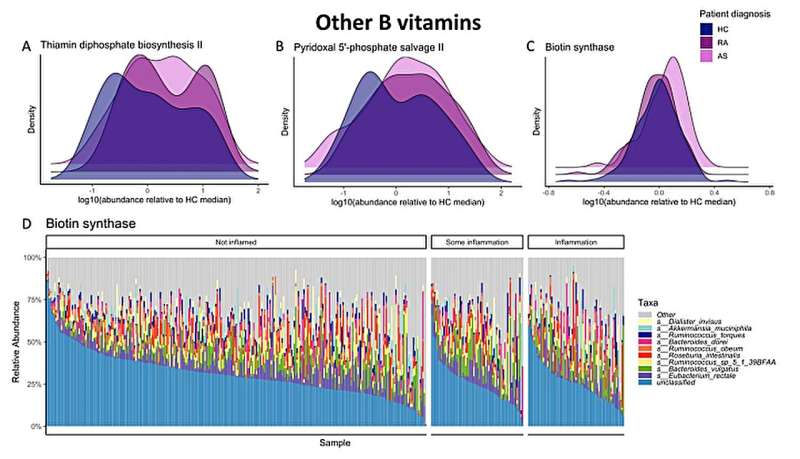July 27, 2023 report
This article has been reviewed according to Science X's editorial process and policies. Editors have highlighted the following attributes while ensuring the content's credibility:
fact-checked
peer-reviewed publication
trusted source
proofread
Alterations in the gut microbiome tied to inflammatory types of arthritis

A large team of inflammation and arthritic specialists, immunologists and other medical researchers affiliated with a number of institutions in the U.S. and the U.K. has found a connection between the human gut microbiome and inflammatory types of arthritis. In their study, reported in the journal Science Translational Medicine, the group compared the gut biomes of healthy people with those who have different types of inflammatory arthritis.
Prior research has shown that there are associations between characteristics of the gut microbiome and inflammatory disease, but until now, no such direct associations have been made. In this new effort, the researchers sought to test a link between abnormalities in the gut biome and inflammatory types of arthritis. To that end, they recruited 440 adult volunteers, approximately half of whom were healthy and half who suffered from at least one type of inflammatory arthritis, such as ankylosing spondylitis, psoriatic or rheumatoid arthritis. Each submitted a stool sample, which allowed the researchers to characterize their gut microbiome.
The research team found that those people suffering from inflammatory diseases had differences in their gut biome compared to those who were healthy. They found that they tended to have fewer Roseburia intestinalis and Faecalibacterium prausnitzii, for example, which are considered to be beneficial bacteria. And they also had more Ruminococcus gnavus and Escherichia coli, which are considered to be harmful.
The researchers also found that due to the differences in gut biome, those with an inflammatory type of arthritis tended to have difficulty harvesting vitamin B from the foods they eat. They also found that such people tend to sequester less iron. This finding suggests possible therapies for people with such afflictions.
In their conclusion, the research team acknowledge that they were not able to establish causation in their work. It is still not clear whether the inflammatory diseases are causing the gut problems or the other way around—or if both are due to an immune system issue. But it does add more evidence, they suggest, of a connection between the gut biome and inflammatory diseases.
More information: Kelsey N. Thompson et al, Alterations in the gut microbiome implicate key taxa and metabolic pathways across inflammatory arthritis phenotypes, Science Translational Medicine (2023). DOI: 10.1126/scitranslmed.abn4722
© 2023 Science X Network




















